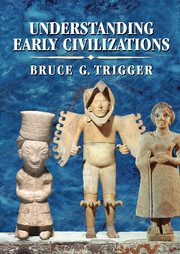Book contents
- Frontmatter
- Contents
- List of Illustrations
- Preface
- Understanding early civilizations
- Introduction
- Sociopolitical organization
- 5 Kingship
- 6 States : City and Territorial
- 7 Urbanism
- 8 Class Systems and Social Mobility
- 9 Family Organization and Gender Roles
- 10 Administration
- 11 Law
- 12 Military Organization
- 13 Sociopolitical Constants and Variables
- Economy
- Cognitive and symbolic aspects
- Discussion
- References
- Index
11 - Law
Published online by Cambridge University Press: 05 June 2014
- Frontmatter
- Contents
- List of Illustrations
- Preface
- Understanding early civilizations
- Introduction
- Sociopolitical organization
- 5 Kingship
- 6 States : City and Territorial
- 7 Urbanism
- 8 Class Systems and Social Mobility
- 9 Family Organization and Gender Roles
- 10 Administration
- 11 Law
- 12 Military Organization
- 13 Sociopolitical Constants and Variables
- Economy
- Cognitive and symbolic aspects
- Discussion
- References
- Index
Summary
An important function of states is to maintain public order. One of the ways this is done is by legal action – settling disputes that might lead to violence, restraining and punishing those whose behaviour harms individuals or society, ensuring that government orders are obeyed, and validating certain controversial actions by individuals and groups (Postgate 1992: 275). Law frequently claims to serve the interests of society as a whole and actually does so insofar as public order benefits everybody. Yet, in early civilizations, the upper classes and the major institutions they controlled had far more wealth and privileges to protect than did commoners, and they relied on the law to do this.
The power to punish crimes, in particular with death, was an important manifestation of a ruler's authority. Among the Yoruba, the sword of state symbolized the exclusive and godlike prerogative of the monarch to execute criminals (Bascom 1969: 83–84). Laws were often claimed to originate with the gods, who transmitted them to humans through the proclamations of rulers. The Aztec term for ‘laws’, nahuatilli, meant ‘a set of commands’ (Offner 1983: 83, 242–45, 282). Laws were a means by which human society was not only regulated but also aligned with a cosmic order that was profoundly hierarchical. The Babylonian word mêšaru and the Egyptian m3ʿt referred both to the cosmic order and to legal justice (Bottéro 1992: 182).
- Type
- Chapter
- Information
- Understanding Early CivilizationsA Comparative Study, pp. 221 - 239Publisher: Cambridge University PressPrint publication year: 2003



